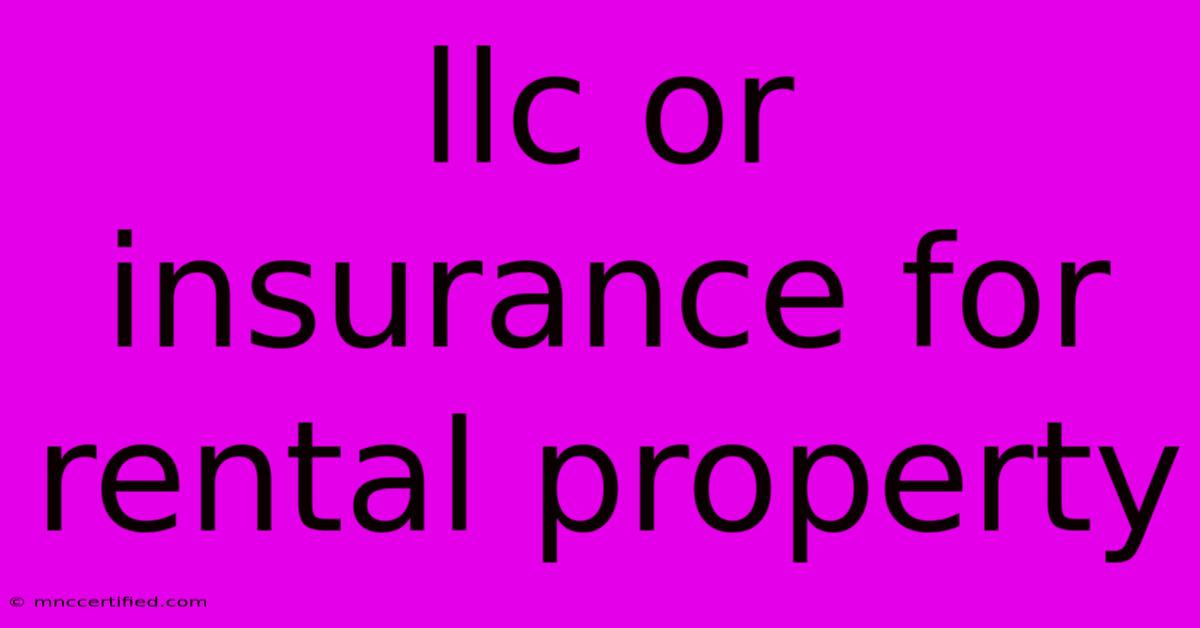Llc Or Insurance For Rental Property

Table of Contents
LLC or Insurance: Protecting Your Rental Property Investment
Owning a rental property can be a lucrative venture, but it also comes with its share of risks. From tenant damage to lawsuits, it's crucial to protect your investment. Two common strategies for mitigating these risks are forming an LLC (Limited Liability Company) and obtaining comprehensive insurance. But which one is right for you?
This guide will explore the benefits and drawbacks of both LLCs and insurance for rental property owners, helping you decide which approach best suits your needs.
Understanding Limited Liability Companies (LLCs)
An LLC is a legal structure that separates your personal assets from your business assets. This means that if your rental property faces legal issues, your personal belongings, bank accounts, and other assets are shielded from liability.
Benefits of an LLC:
- Limited Liability Protection: The most significant advantage of an LLC is its ability to protect your personal assets.
- Tax Advantages: Depending on your specific situation, an LLC can offer tax advantages compared to sole proprietorships or partnerships.
- Credibility and Professionalism: Forming an LLC can add a level of professionalism and credibility to your rental business.
Drawbacks of an LLC:
- Formation Costs: There are costs associated with forming an LLC, including filing fees and legal expenses.
- Increased Complexity: Managing an LLC can require additional paperwork and administrative tasks compared to sole proprietorships.
- Potential Liability: While an LLC offers strong protection, it's not foolproof. Certain circumstances can still expose you to personal liability.
Essential Insurance for Rental Properties
Comprehensive insurance is crucial for protecting your rental property from a range of unexpected events. It acts as a safety net against financial losses, ensuring you can recover from disasters and unforeseen situations.
Types of Insurance for Rental Property Owners:
- Landlord Insurance: Covers damage to the property itself, as well as liability claims from tenants or visitors.
- Renters Insurance: Protects tenants against their personal property loss or damage.
- Liability Insurance: Covers legal expenses and settlements if you are sued by a tenant or guest due to an injury or property damage.
Benefits of Insurance:
- Financial Protection: Insurance provides financial coverage to repair or rebuild your property after damage or to settle legal claims.
- Peace of Mind: Knowing you are insured can reduce stress and anxiety regarding potential risks.
- Compliance: Some lenders require rental property owners to maintain specific insurance coverage.
Drawbacks of Insurance:
- Premiums: Insurance premiums can be expensive, especially for high-risk properties.
- Deductibles: You will have to pay a deductible before your insurance policy covers any losses.
- Policy Limitations: Insurance policies have limitations and exclusions, meaning certain situations may not be covered.
LLC or Insurance: Choosing the Right Protection
So, which is better – an LLC or insurance? The answer is that both are essential for protecting your rental property investment.
- An LLC protects your personal assets from liability, while insurance protects your property and finances from damage and claims.
The best approach is often a combination of both. Forming an LLC offers legal protection, while comprehensive insurance provides financial security against various risks.
Tips for Choosing the Right Approach:
- Assess Your Risk: Analyze the potential risks associated with your rental property and your tolerance for financial loss.
- Seek Professional Advice: Consult with an attorney and an insurance broker to understand your specific needs and available options.
- Consider State Laws: Laws regarding LLCs and insurance vary from state to state.
- Budget Carefully: Factor in the costs of forming an LLC and maintaining insurance premiums when planning your rental property investment.
Conclusion:
Protecting your rental property is crucial for ensuring a successful and profitable investment. By understanding the benefits and drawbacks of LLCs and insurance, you can create a robust strategy to safeguard your assets and finances. Remember that combining both approaches can offer the most comprehensive protection, giving you peace of mind and a secure foundation for your rental property venture.

Thank you for visiting our website wich cover about Llc Or Insurance For Rental Property. We hope the information provided has been useful to you. Feel free to contact us if you have any questions or need further assistance. See you next time and dont miss to bookmark.
Featured Posts
-
Best Rookie Cards To Invest In 2024
Nov 14, 2024
-
How Much Does Ankle Surgery Cost With Insurance
Nov 14, 2024
-
Margin Clause In Property Insurance
Nov 14, 2024
-
Wednesday Season 2 Lady Gaga Guest Appearance
Nov 14, 2024
-
Lady Gaga In Wednesday Season Two
Nov 14, 2024